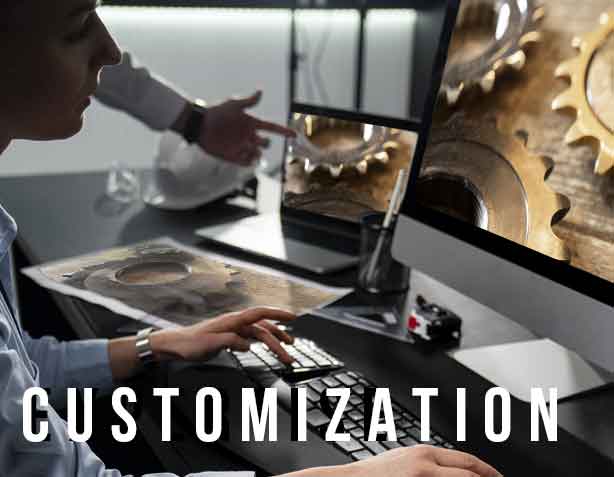Mechanical Design Services

DFM

ROBOTICS

AVIATION

MEDICAL
Mechanical design plays a crucial role in shaping the technologies we interact with daily. Did you know that nearly 70% of manufactured products require some form of mechanical design? This highlights not only the prevalence of mechanical design across industries but also its significant impact on innovation and efficiency.
Mechanical design refers to the process of developing machinery and equipment that meet specific performance criteria while considering constraints such as cost, materials, and functionality. Careers in this field are diverse, encompassing areas such as automotive, aerospace, robotics, and biomechanics, making it an exciting domain for both students and professionals.
Design for Manufacturing (DFM)
In mechanical design a crucial aspect of the product development process is DFM. It focuses on optimizing the design to ensure efficient reliability.
By incorporating DFM principles, our designers can minimize the risk of overheating, component failure, and other mechanical issues that may arise during manufacturing and operation. This proactive approach not only enhances the overall performance of the product but also reduces manufacturing costs and time-to-market.
DFM for manufacturing involves considering various factors such as material selection, component placement, and assembly techniques to ensure that the product can be efficiently manufactured. One of the key aspects of DFM is designing for ease of assembly, which involves simplifying the assembly process and reducing the number of components and fasteners required.
This not only improves manufacturing efficiency but also reduces the chances of assembly errors and improves overall product quality. Additionally, DFM also takes into account the manufacturability of the design, ensuring that it can be easily produced using the available manufacturing processes and equipment.
By considering manufacturability, designers can avoid creating designs that are difficult or costly to produce. This includes designing parts that can be easily machined, molded, or fabricated, as well as selecting materials that are readily available and suitable for the intended manufacturing process.
Furthermore, in mechanical design, DFM also involves considering the tolerances and specifications required for each component, ensuring that they can be consistently and accurately produced within the desired range. Overall, incorporating DFM principles into the design process can lead to more efficient and cost-effective manufacturing, resulting in higher-quality products and satisfied customers.
Designing for manufacturability involves careful consideration of:
- Material selection
- Cost-effectiveness
- Ease of manufacturability
An industry expert once stated, “DFM is not just a process; it’s the backbone of efficient production.” This highlights its importance for any successful machine design.
Case Study: XYZ Robotics
Consider the case of XYZ Robotics, which successfully designed a robotic arm for assembly lines. By using advanced materials and efficient mechanisms, they reduced production time by 30%, setting a benchmark for efficiency in machine design.
Robotics and Automation
Industrial Robot Design
Industrial robots come in various types:
- Articulated: Flexible for various tasks.
- SCARA: Ideal for assembly tasks.
Designing robotic arms poses challenges like ensuring precision and strength while remaining cost-effective.
Automation System Design
The design process for automated systems follows these steps:
- Concept Development
- Design Engineering
- Implementation and Testing
Real-world examples include automated warehouses where robots perform picking and packing, improving efficiency and reducing labor costs.
Emerging Trends in Robotics
The rise of AI and machine learning is transforming robotics design. Smart algorithms allow robots to learn from their environment, leading to autonomous systems capable of complex tasks.
Aviation
Aircraft design requires a focus on aerodynamics. Factors such as wing shape and materials significantly impact performance. Studies show that aerodynamic efficiency can enhance fuel economy by up to 20%.
Materials Selection
In aerospace design, lightweight, high-strength materials like carbon fiber and titanium are vital for performance and safety. These materials play a key role in reducing overall aircraft weight while enhancing structural integrity.
Biomechanical Engineering
Medical Devices
The design process for medical devices must align with strict regulatory requirements. The medical device market is expected to grow by 10% annually, underscoring the importance of this field.
Machine Design
Mechanisms and Their Applications
Mechanical design often starts with mechanisms. Examples include:
- Levers: Used in various tools and machinery.
- Gears: Essential for transferring motion and force.
- Cams: Common in automation systems.
Statistics reveal that gear mechanisms dominate the automotive industry, with over 80% of vehicles using some form of gear systems.
Mechanical design services, serving: Seattle, Portland, Oakland, San Francisco, Livermore, Santa Clara, Silicon Valley, San Jose, Los Angeles, Orange County, San Diego, Sacramento, Denver, Salt Lake City, Dallas, Austin, Houston, Phoenix, Boston, New York, Chicago, Tampa, Miami, Minneapolis, Canada, Europe, Asia, Australia.








